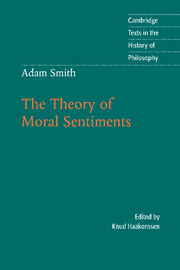Book contents
- Frontmatter
- Contents
- Introduction
- Chronology
- Further reading
- Note on the text
- Abbreviations
- The Theory of Moral Sentiments
- Advertisement
- Contents
- Part I Of the propriety of action
- Part II Of merit and demerit; or, of the objects of reward and punishment
- Part III Of the foundation of our judgments concerning our own sentiments and conduct, and of the sense of duty
- Part IV Of the effect of utility upon the sentiment of approbation
- Part V Of the influence of custom and fashion upon the sentiments of moral approbation and disapprobation
- Part VI Of the character of virtue
- Part VII Of systems of moral philosophy
- Index
- Cambridge texts in the history of philosophy
Part II - Of merit and demerit; or, of the objects of reward and punishment
Published online by Cambridge University Press: 05 June 2012
- Frontmatter
- Contents
- Introduction
- Chronology
- Further reading
- Note on the text
- Abbreviations
- The Theory of Moral Sentiments
- Advertisement
- Contents
- Part I Of the propriety of action
- Part II Of merit and demerit; or, of the objects of reward and punishment
- Part III Of the foundation of our judgments concerning our own sentiments and conduct, and of the sense of duty
- Part IV Of the effect of utility upon the sentiment of approbation
- Part V Of the influence of custom and fashion upon the sentiments of moral approbation and disapprobation
- Part VI Of the character of virtue
- Part VII Of systems of moral philosophy
- Index
- Cambridge texts in the history of philosophy
Summary
Of the sense of merit and demerit
Introduction
1 There is another set of qualities ascribed to the actions and conduct of mankind, distinct from their propriety or impropriety, their decency or ungracefulness, and which are the objects of a distinct species of approbation and disapprobation. These are Merit and Demerit, the qualities of deserving reward, and of deserving punishment.
2 It has already been observed, that the sentiment or affection of the heart, from which any action proceeds, and upon which its whole virtue or vice depends, may be considered under two different aspects, or in two different relations: first, in relation to the cause or object which excites it; and, secondly, in relation to the end which it proposes, or to the effect which it tends to produce: that upon the suitableness or unsuitableness, upon the proportion or disproportion, which the affection seems to bear to the cause or object which excites it, depends the propriety or impropriety, the decency or ungracefulness of the consequent action; and that upon the beneficial or hurtful effects which the affection proposes or tends to produce, depends the merit or demerit, the good or ill desert of the action to which it gives occasion. Wherein consists our sense of the propriety or impropriety of actions, has been explained in the former part of this discourse. We come now to consider, wherein consists that of their good or ill desert.
Information
- Type
- Chapter
- Information
- Adam Smith: The Theory of Moral Sentiments , pp. 78 - 127Publisher: Cambridge University PressPrint publication year: 2002
